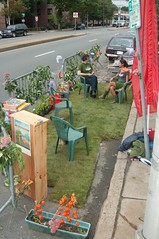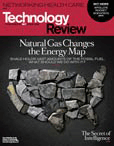
Brad Winnett from MassRIDES discusses green alternatives while other panelists look on.
On Wednesday August 25th, the Cambridge Energy Alliance and the Sustainable Business Leader Program hosted a Green Transportation Workshop. Panelists discussed ways to make a key facet of business operations, employee transportation, “green.”
Stephanie Anderberg from Cambridge Community Development discussed how businesses can support alternative transportation with help from Pre-tax Commuter Benefits. Basically, these are ways in which businesses can pay for their employees’ green travel (e.g. shuttles, vanpools, biking, the T) before taxes are considered. These can be administered in several fairly easy ways, including giving vouchers or using a 3rd party administrator.
Jim Gascoigne from the Charles River TMA opened with a significant statistic: a staggering 67% of people in Cambridge – an environmentally forward-thinking city – get to work by driving in cars alone. Mr. Gascoigne went on to explain that while the Charles River TMA’s purpose is to reduce traffic congestion and improve air quality, it’s also to help Cambridge citizens reach for more environmentally responsible solutions. Specific services Jim discussed were the public $1 per ride EZride shuttle, which goes to areas around Cambridge that the T does not reach, and an Emergency taxi Ride Home voucher for members.
Brad Winnett from MassRIDES spoke about how his state-wide organization works individually with businesses to incorporate customized combinations of transportation programs that suit their unique circumstances. These combos include ride-sharing, vanpools, biking, walking, the T, and tele-working.
Shane Jordan presented for Mass Bike, a state-wide bicycling advocacy group that supplies many services. Mass Bike Provides three different kinds of 1-hour workshops – general biking, bike maintenance, and one for winter bike-riding. Shane mentioned that Mass Bike has a valet bike parking service, as well as a consulting service. Lastly, Mr. Jordan suggested that if an organization wanted to perform a biking event but didn’t have insurance, they could partner with Mass Bike to be covered under Mass Bike’s insurance.
Zipcar is a membership-based car-sharing service, and was represented on the Green Transportation panel by Matt Kurkowski. Mr. Kurkowski discussed the various benefits of the multiple Zipcar programs and options. Zipcar was what helped one audience member (Janie Katz) transition from 30 years of driving her own car to a no-car diet; others discussed the convenience of the service when traveling for business or for emergencies. For businesses, the Zipcar program is significantly more cost-effective than it might be for the already-affordable personal accounts, making this a great business choice.
After this, Metro Pedal Power (unable to be represented at the event) was discussed thoroughly by the hosts as well as multiple panelists. This company is a local, bike-powered delivery service that provides regularly scheduled as well as on-call deliveries of up to 500 pounds, in all weather. This service makes sense for so ma ny members of the community who may need to transport something only across town, but would otherwise have to ship via UPS or FedEx, whose warehouse check-in point might even be out of state. The service is cost-effective because of the lack of spending on gasoline, and you are reducing the carbon you emit by keeping fossil-fuel-burning vehicles off the road.
ny members of the community who may need to transport something only across town, but would otherwise have to ship via UPS or FedEx, whose warehouse check-in point might even be out of state. The service is cost-effective because of the lack of spending on gasoline, and you are reducing the carbon you emit by keeping fossil-fuel-burning vehicles off the road.
In addition, Janie Katz-Christy, the director of the Green Streets Initiative shared how businesses and employees can get involved in Walk/Ride Days. Walk/Ride Days are on the last Friday of each month, when people can use sustainable transportation and get rewarded by local businesses for doing so. Walk/Ride Days have had excellent results for all kinds of large and small businesses and the Fed DOT is now funding a project to spread Walk/Ride Days to 6 Boston-region communities.
The last mentioned service was that of the downtown-Boston-based Urban Adventours, who offer bike tours throughout the city. This is a great way to get people introduced to the concept of biking as an alternative transportation, as well. For organizations who need bikes to get started, this is one of the bike rental providers in Boston.
——
This workshop was full of organizations who, as a combination, can comprehensively make our community more fossil-fuel independent than ever. I strongly urge you to take advantage of some or all of the services detailed here- and tell your friends!
As always- you may comment here, or email me personally at jgorden@cambridgeenergyalliance.org if you have further questions.
![]() What should we do about climate change?
What should we do about climate change?









 On Monday, as another step in
On Monday, as another step in